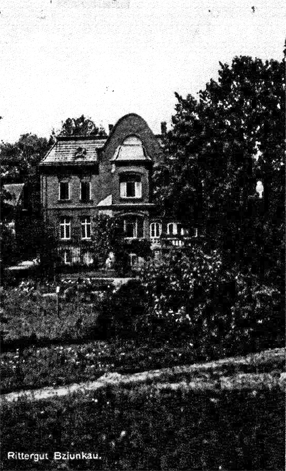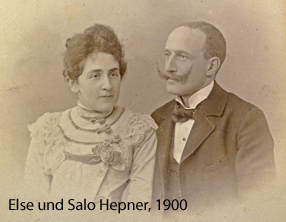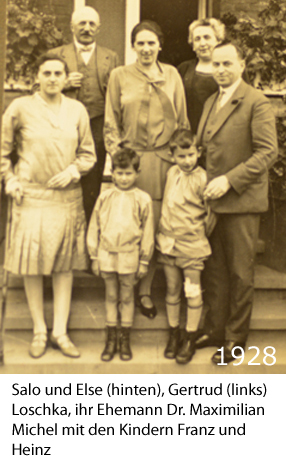
Almost at the same time when I started my research Ann Michel visited Guttentag. When her grandmother, Loschka Michel, died in 1988 and Ann Michel cleared the flat she learnt that her great-grandparents Salo and Else Hepner were Jews and run a estate close to Guttentag.
Shortly after Ann could persuade her father to visit Dobrodzien/Guttentag, just before he died. In 2014 Ann came back with a reporter of the German radio NDR. With the reporter she found out that
Here you can hear how the grand-granddaughter of the Hepners of the mannerhouse
Bzionków searched for her family history or read here the notes.
During the work on the radio report Ann developed the idea to restore the old farm.
This idea was highly welcomed in Guttentag/Dobrodzien. In March 2015 the NDR and the Deutsche Kulturforum östliches Europa organized a panel discussion to create ideas for how to use it. On the podium also Bolko von Schweinichen was placed, the son of Udo von Schweinichen.
Read here a press report on the panel discussion.
Asking how the deal took place anybody could answer. Therefore I was shocked about this arragement. Without any research how the property deal was made the great-grandchild of the victims was brought into contact with the purchaser from the Nazi time. Confronted with my reservation, the Kulturforum couldn't understand it. Ann and Bolko had enjoyed to meet each other. They were lying in each other’s arms. So much impartiality - I thought that it doesn’t make sense to discuss it further.
Salo was a good friend of the catholic priest Johann Gladysz (*7/5/1881 ✝3/22/1967). In 1947 he wrote to the Eisners a letter in which he described what good reputation the Hepners had, how charitable they were and how terrible their fate. I translated this letter for Ann Michel and sent it to her via the NDR.
Read here, what the Guttentag priest Gladysz 1947
wrote to the Eisner family about what happened since 1938.
Please recognize that the priest was informed wrongly about
the concentration camp. The Hepners were not deported
to Freudenthal but to Theresienstadt.
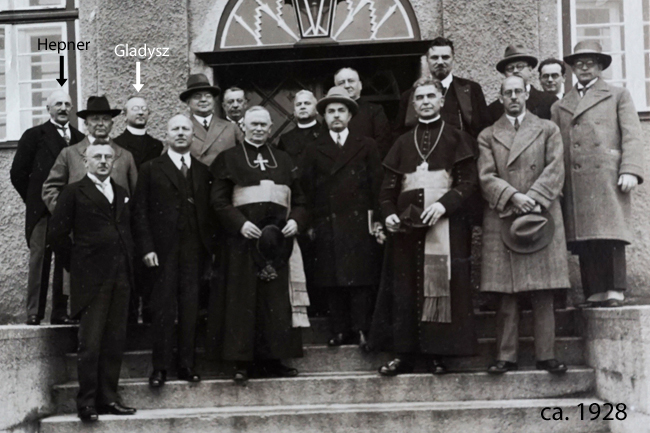
So Ann had learnt about the research of the story of my grandfather and the Eisner-family. She also had become skeptical about the role of Udo von Schweinichen. I offered her to order the restitutions files.
Here are the results of my research and what Ann told me:
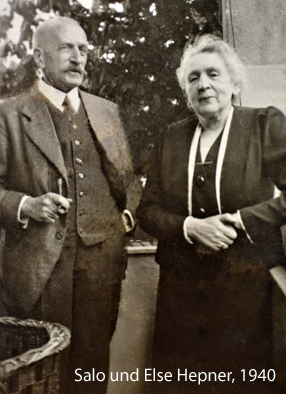 Salo Hepner (*1/29/1865 in Jaratschewo) and his wife Else (nee. Wendriner, * 4/16/1877) run the Johannahof (today Bziunkow), a big farm in Wiesenau close to Guttentag. The farm had a size of 432 ha and there was also a distillery (potatoes) and a market garden. Salo Hepner bred warmbloods, pigs and cattle. The manor house had 14 rooms.
Salo Hepner (*1/29/1865 in Jaratschewo) and his wife Else (nee. Wendriner, * 4/16/1877) run the Johannahof (today Bziunkow), a big farm in Wiesenau close to Guttentag. The farm had a size of 432 ha and there was also a distillery (potatoes) and a market garden. Salo Hepner bred warmbloods, pigs and cattle. The manor house had 14 rooms.
Since 1890 Salo Hepner was the caretaker of Johannahof. In 1926 he purchased it for 375,000 RM for what he needed a mortgage of 294,000 RM.
Here you can find the purchase contract for the Johannahof.
As Heinz Pallus, the son of the CEO of the local savings bank, said, Salo Hepner was also a board member of the local savings bank until the Nazis came into power. He also was Amtsrat (councilor).
In 1938 Salo Hepner obviously had alread sold Johannahof to managing director J. Kolodziejook. When in Reichskristallnacht the drunken SA-men came, his brother in law Bieber protected Johannahof by convincing them that the farm already was owned by a "German" and no longer by the Jew Hepner.
Read here the testimoney of J. Kolodziejook
At the next day, November 10, 1938 the Nazis used their pre-emption right. The property was then owned by the public “Oberschlesische Landgesellschaft” (Upper Silesia land company). The purchase price was paid to an already confiscated bank account of the Hepners who were allowed to use 150 RM each month for their living.
The Hepners tried to flee in 1939, but they didn't get off the train in Hamburg even it is known that they got on.
In spring 1942 the Hepners were arrested and lived in differed Houses of Jews in Breslau. On July 26, 1942 they were deported from a house of Jews in Breslau, Kürassierstr. 19 to the concentration camp Theresienstadt.
Here you can find the deportation list of the transport IX/1.
There Else died after a few weeks on August 12, 1942. Salo died one year later, on July 9, 1943.
Here you can find the deat certificate of Salo Hepner.
On July 1, 1943 the Johannahof was sold to Udo von Schweinichen. Being a son of a family of officers he had decided to become a farmer and was searching for his own farm. He knew the Johannahof very well because in 1922 he had made his apprenticeship there. When he heart that the Johannahof was sold, he bought it. He purchased only 286 ha, the rest were given in small pieces to small farmers. Udo von Schweinichen paid 315,000 RM. A few days before the war ended and he had to flee himself he paid back 214,000 RM of the debt so that he paid in total 529,000 RM. At the time Udo von Schweinichen was signing the contract Salo Hepner was dying. Already almost 5 years earlier he had lost his farm. So Udo von Schweinichen has nothing to do with the arianisation process of Johannahof. But he knew Salo Hepner from his apprenticeship and he knew that he was Jewish. Therefore at least he must have had a premonition of how Salo Hepner lost Johannahof and which fate he and his wife had to face. Was he indirect involved in the doing of the Nazis? Is he indirect at fault? I think everybody will answer this differently.
Udo von Schweinichen was well known to the family. He stemmed from a well-to-do family who akquired over several centuries a lot of land. In the 20ties Udo von Schweinichen made an apprenticeship at the farm of the Hepners. I suppose that the Hepners still lived on Johannahof when they learnt about the auction. I think that it is possible that Salo Hepner then asked Udo von Schweinichen to purchase Johannahof.
Loschka, their daughter (*08/19/1902), married on 07/07/1921 Dr. Max Michel (*22/10/1888). The couple had two sons, Heinz and Franz. Dr. Michel became the head of the theater department of Frankfurt. On 01/08/1931 Karl Lang, a member of the NSDAP, initiated a first motion of no confidence. This was not successful because the Nazis were not yet into power, but in August 1933 Dr. Michel lost his job and was retired on the basis of the new Nazi-legislation for officals. The family moved to Berlin in 1936 and emigrated to the US in 1939. In 1940 Dr. Michel lost his German citizenship. Already in 1941 Loschka became a widow. She first opened a "Pensionat" and later made catering. She became quite well off. She died in 1998.
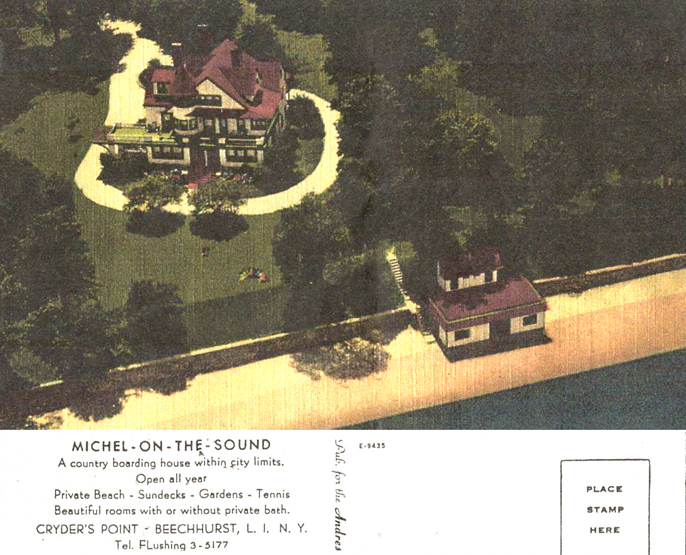
Trude Hepner, her sister (*04/17/1904), lived on Johannahof. Finally in 1941 she could manage to escape. First she fled to Switzerland officially for the treatment of her eyes. In 1951 she followed her sister to New York and worked and lived together with her. After she arrived she was happy as a lark. She enjoied everything: the lights, the shops, the skyscrapers, the landscape and all the different goods from all countries in the world.
She never married but lived together with her sister. In the 70ties she was almost blind. She died in 1977.
Read here a letter which Trude (Truschka) Hepner wrote in December 1951
to the Roczek family in Guttentag.
Both sisters filed for compensation. More of less everything was accepted. The value of the farm was reduced only by half of the mortgage and by 6,300 RM, the amount Salo Hepner and his wife could withdraw from his confiscated bank account. Each of the sisters got 40,000 DM.
Also Udo von Schweinchen filed for compensation. Unfortunately, the file cannot be found. But from the file of Loschka and Gertrud it is known that Udo von Schweinichen got his compensation much earlier, because the letters of the restitution office to America always lasted very long and the restitution office was not ready to send them by airmail and not directly but always via the embassy.
Loschka further got a pension from the city of Frankfurt which was based on 75 % of the last income of her husband.
Read here the notice of pension granted.
In the 50ties and 60ties Loschka travelled almost every 2 years to Frankfurt. She was not only welcomed as a friend, but almost like a guest of state. A car of the state cancellery brought her from the airport to the hotel where red colves welcomed her. Receptions and excursions were organized and Loschka could use the opera ticket of the mayor. Books about the reconstruction of Frankfurt were often sent to her when she was back in America. Often she also got help during her restitution process. Once a high official of the city Mr. Kohl even offered her to organize a meeting with him, the mayor and other high officals to reach a positive weighting of her restitution proposal which was not possible within the offical process.
Read here the offer of Mr. Kohl.
